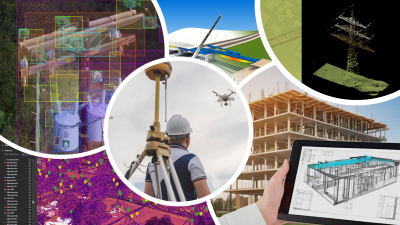Over the last month we’ve spent a lot of time on these pages looking ahead to Geo Week 2024, which is now just over a week away. Professionals from the geospatial and AEC industries will come together in Denver, Colorado from February 11 through February 13 for a three-day event. We’ve looked at some of the specific sessions that will be held, including sessions from the World Geospatial Industry Council and the keynotes, and the action that will take place on the Exhibit Hall Theater.
We all know that for these types of events, there are always some specific topics going in that we’re hoping to learn more about and see the latest updates from thought leaders within these specific spaces. Of course, we generally find new, unexpected topics that grab our attention as well, but I know personally there are a few topics I’m excited to hear about in relation to the geospatial context. Below are three of those topics, and some sessions that will be touching on them.
Bathymetry
While measuring the elevation of coastlines and gaining knowledge of that terrain is not a new aspect of geospatial work, it is an area whose focus has grown tremendously in recent years. With technological improvements that have increased the accuracy and power of these systems while also reducing the size, the ability for surveyors to complete this work has exploded. In fact, because of the innovation around size in particular, more topobathymetric work has been possible more often. That, combined with growing problems around climate change meaning this data is more valuable than ever, has increased the value of this work significantly.
These realities will be reflected at Geo Week, where bathymetry will be a focus both in conference sessions and on the exhibit floor. For the latter, companies like YellowScan, RIEGL, Hexagon, and others will have products for these workflows at their booth along with team members who can speak to the applications. For sessions, NOAA’s Ashley Chappel will be leading a session, From the Beach to the Blue, looking at the importance of having elevation data along coastlines. Additionally, the ASPRS will be hosting the following sessions looking at this work:
Artificial Intelligence
These days, you can’t have a conversation about anything even remotely related to technology without artificial intelligence coming up. A lot of this has to do with generative AI, with tools like ChatGPT and Dall-E making waves in the consumer space. Money is flowing into all kinds of AI, though, and the geospatial industry in particular is ripe for disruption from this technology. Given the sheer size of geospatial datasets, to say nothing of the complexity, AI already has radically changed the way work is done and will continue to do so. Walking around the exhibit hall floor having conversations with colleagues from all corners of the industry, you can be sure that AI will be at the heart of many discussions.
It will also be at the heart of so many of the sessions put on throughout the three-day event. Some sessions, like AI/Machine Learning Opportunities for Geospatial Data and Machine and Deep Learning Applications using Remotely Sensed Data, will explicitly touch on these tools and make them the focus of the entire session. But you can be assured that even if AI isn’t in the description of the session, it’s more likely than not it will come up in some form or another, and I’m willing to bet everyone will hear at least one way it’s being used that of which they were previously unaware.
UAVs
Similar to the way that bathymetry is not a new tool, per se, UAVs have been around for quite some time. Improvements in performance and design, however, have opened up a host of new possibilities for the technology. It’s easier to gain access to both drones and sensor payloads for said drones, and they are becoming easier to use. In the geospatial space, this means that more surveyors are taking advantage of drones to capture data that is either impossible or dangerous to collect traditionally, while utility and asset owners are using it to complete inspections.
At this year’s Geo Week, you can expect UAVs to be a major focus both on the exhibit hall floor and throughout sessions. On the floor, a number of companies will have their own hardware on display, while other companies and service providers will be able to speak to how they’re implementing drones in their workflows. Meanwhile, sessions like Professional Mapping Using Drones, Getting Off the Ground with UAV Survey, and Reaching New Heights in UAS Surveying will feature experienced professionals sharing tips and tricks for those looking to get into this space for the first time.






